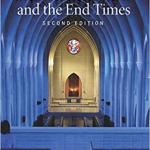
The popular conception that there will be certain “signs” that precede the coming of Jesus distracts the church from its proper focus and instead encourages a way of thinking that is antithetical, and shall I say harmful, and even destructive, to the work of the Gospel.
Learning a lesson from history
The panic of Covid-19 is only the latest stir to arouse the conviction that indeed these are the “last days.”
Now, it is worth noting that we can learn lessons from history. Every time, for the last two millenia (just read 2nd Thessalonians to note that it was happening at the time of Paul) a crisis of this nature happens, there have been those crying out that the world is ending.
In the last century so-called “prophecy experts” wrote books, blogs, and propagated their false prophecies on broadcasts around the world, yet, thus far, every one of them has also been wrong.
“Signs of the times”?
A week ago, I made a post on my Facebook page making a shameful plug for my book Understanding the New Testament and the End Times (note how I inserted a shameful plug here and you didn’t even notice; btw the book is available on Amazon). 
In my post, I commented that “it is time for the people of God to wake up and get busy. Not reading the ‘signs of the times’ but doing the work of the kingdom!”
Someone replied to my post, “why not do both?” That is, why not do the work of the Kingdom and read the “signs” of the times? This seems like a fair question. And it is worthy of a response.
My response is simple. The New Testament does not give us any “signs of the times”—at least in regard to the return of Jesus.
I know that this may seem hard to believe. And many of you are rushing to your New Testaments right now (or to google) certain that you can prove me wrong. So, allow me to clarify.
The New Testament and the signs of the times
The stress in the NT is not on giving the people of God indications as to when Jesus is going to return, but on whether or not we are prepared.
When a parent tells their child they are heading out and gives them a list of chores to be done while they are away, we all know the inevitable question that arises next: “when will you be back?” The child is not asking because they will miss their parent in the meantime. They are asking because they want to know how much time they have to slack off.
Throughout all the speeches of Jesus, the repeated refrain is, “keep/be on the alert” (Mark 13:33, 35, 37; Matt 24:42). The reason for this command is clear: “you do not know when the appointed time is” (Mark 13:33); “for you do not know which day your Lord is coming” (Matt 24:42).
That is, you don’t how much time you have to slack off! Therefore, get to work!
Jesus never tells us, nor does He give us any indication (allow me to defend this below) as to when He is coming back. Neither does Paul, nor any of the NT authors. This is not their concern. Their concern is that God’s people are busy doing the work of the kingdom—by the work of the kingdom, I mean making Christ known!
“But be sure of this, that if the head of the house had known at what time of the night the thief was coming, he would have been on the alert and would not have allowed his house to be broken into. For this reason, you also must be ready; for the Son of Man is coming at an hour when you do not think He will” (Matt 24:43-44).
What about the “signs” that Jesus promised His disciples?
Several things need to be said here (again I refer the interested reader to a much longer discussion in my book: see chs 9-10).
For one, if Jesus gave clear signs as to when He was going to return, why didn’t Paul or any of the other NT writers pick up on those signs and provide more insight or clarity?
The fact that nothing else in the NT elaborates on these “signs” suggests that maybe this is not what Jesus was saying.
This first point is more significant than one might think. After all, at the time of Jesus’ speech, the disciples didn’t even realize that Jesus was going anywhere. By the time Paul writes to the churches, however, the question of Jesus’ return was very pertinent.
So, why then did not Paul, or Peter, or anyone else for that matter, not pick up Jesus’ words and say, “well, in regard to Jesus’ return, this is what He meant!”?
The reason why no other NT writers pick up on Jesus’ words and elaborate on what the “signs” are in regard to His return is that Jesus was clear: He didn’t know when He was going to return! (Mark 13:32; Matt 24:36).
Jesus even equated the time of His return with the days of Noah. No one was expecting the flood—not even Noah! Noah may have been prepared—after all he had built a boat.
This is what Jesus means when He says, “For as in those days before the flood they were eating and drinking, marrying and giving in marriage, until the day that Noah entered the ark, and they did not understand until the flood came and took them all away; so will the coming of the Son of Man be” (Matt 24:38-39).
They were all surprised when the flood came. Noah may have been ready, but he didn’t know when it was going to happen!
But didn’t Jesus give clear “signs”?
The speech in Mark 13, which is also found in Matt 24 and Luke 17, 21, is in response to the disciples’ question: “Tell us, when will these things be, and what will be the sign when all these things are going to be fulfilled?” (Mark 13:4).
The disciples’ question, however, is in response to Jesus’ declaration regarding the temple, “Do you see these great buildings? Not one stone will be left upon another which will not be torn down” (Mark 13:2).
Jesus’ reply, or “signs”, can be boiled into two categories.
The first category of “signs” is more generic. These indicate that there will be some period of time before Jerusalem and the temple will be destroyed. This period of time will be characterized by “life as normal.” It includes a time of war, famine, and earthquakes. These are not “signs” in and of themselves because they characterize every era.
This first period also included a time of suffering and persecution for the disciples: “they will deliver you to the courts, and you will be flogged in the synagogues” (Mark 13:9).
The second category of “signs” were more explicit. Mark (and Matthew) indicate, “But when you see the abomination of desolation standing where it should not be” (Mark 13:14; cf Matt 24:15). This citation from the book of Daniel may have been unclear to some. Consequently, Luke helps his readers by noting that it means, “But when you see Jerusalem surrounded by armies, then recognize that her desolation is near” (Luke 21:20).
This second category of “signs” meant that when the disciples saw Rome about to invade, “then those who are in Judea must flee to the mountains” (Mark 13:14).
This second category of “signs”, then, in Mark, Matt, and Luke are clearly in the context of the impending destruction of Jerusalem—which happened to occur precisely forty years after the death of Jesus (AD 70): i.e., within “one generation.”
As we look at the NT then we have these two categories of “signs.” The second category clearly depicted the events surrounding the destruction of Jerusalem are not relevant to the discussion of the second coming of Jesus.
The first category of “signs” in Mark 13 include war, famine, and disease. And it is these that people today consider when they claim to refer to the “signs” of Jesus’ impending return.
It is very important to note that they are never given in Scripture as an indication of the return of Christ. They are only noted as a sort of “life goes on as normal.” They characterize every age!
This is the case with the first four seals of the book of Revelation as I noted in my post on Mar 17, 2020.
This means that we have nothing in the NT that provides any indication as to when Jesus is going to return.
This makes sense as to why Paul and the other NT writers do not add any clarity. Surely, the churches of the first century had the same questions that we do: “when is He coming?”—this is clearly a major concern of the Thessalonian letters.
NB: I do point out in my book that the NT provides three “signs”—though they are not “signs” as is commonly perceived—that will precede the return of Jesus. These are the suffering of God’s people, the conversion of the nations, and the holiness of God’s people!
Covid-19 and God as wrathful
Another problem that I have with the suggestion that Covid-19 is God’s wrath on the world and is a “sign” of Jesus’ imminent return is that it conveys the notion that God is this wrathful being who stands in heaven desiring to punish everyone! I addressed this issue in more depth in my post of Mar 17, 2020.
In other words, and what I am saying here is easy to misconstrue, when we suggest that God is inflicting Covid-19 on the world as some sort of divine punishment, what many people in society hear is that God is some cosmic judge with whom they want nothing to do.
Think about it. If you are the average person on the street who has little-to-no conception of the Christian story (a story of how God lovingly entered into our mess and died for us in order to redeem us from this mess) and you heard that God was punishing people, including children and the disadvantage (remember, Covid-19, as with most pandemics, affects the disadvantaged disproportionately), you would likely be repelled from believing in this God.
Sure, we as Christians have a theological grid through which we can filter the love and justice of God in such a way that we can reconcile (at least somewhat) how God allows humankind to betray His will and suffer the consequences of doing so. We understand that war, violence, destruction, famine, and death, which include natural disasters and disease, are the result of human sin.
Those of us in the church, who read our Bibles, and who know a little bit of biblical theology, understand this. But those who don’t have this background, don’t understand this and hear things this way. All they hear is that God is some cosmic judge who ruthlessly dispenses wrath on the world.
Now, I am not suggesting that we leave out final judgment, wrath, or hell from our conversations. I am saying that we have to be careful how we frame these conversations.
What does this mean?
Why not both? Why can we not both be about the mission of God and looking for “signs”?
Well for one, there are no “signs” to be looking for. To be busy looking for signs, then, is to distract us from our mission.
This does not mean that we cannot, and should not, cry out “how long, O’ Lord.”
One more thought!
The notion that Covid-19 or whatever the pandemic of the day might be (I can totally imagine reusing this post in 5 or 10 years and just substituting some war or natural disaster or another pandemic in for “Covid-19”) is a sign of the imminent return of Jesus is inherently selfish!
If this line of thinking were theologically correct, and I don’t believe it is, it would suggest that God is soon returning, and He is here to rescue me and those like me and to punish the rest of you all. Good for me and bummer for you!
Now, when Jesus returns there will indeed be a “good for me” and “bummer for you” sort of deal.
But in the meantime, the Gospel is a message of love. “For God so loved the world, that He gave His only begotten Son, that whoever believes in Him shall not perish, but have eternal life” (John 3:16).
Are we living in the Last Days? Yes, but so was Paul, Aquila and Priscilla, Augustine, and everyone else since the day of Pentecost!
And our call is no different than theirs. “Go into all nations and make disciples!”
Mind you: I do believe that the Gospel and the Kingdom have an adversary. That adversary will do and is doing, anything and everything to distract the people of God from accomplishing the work of God’s kingdom. He is the deceiver. And I believe that one of his aims is to deter our attention from our proper focus and onto ancillary matters.
So, yes, I believe this discussion is vital!












